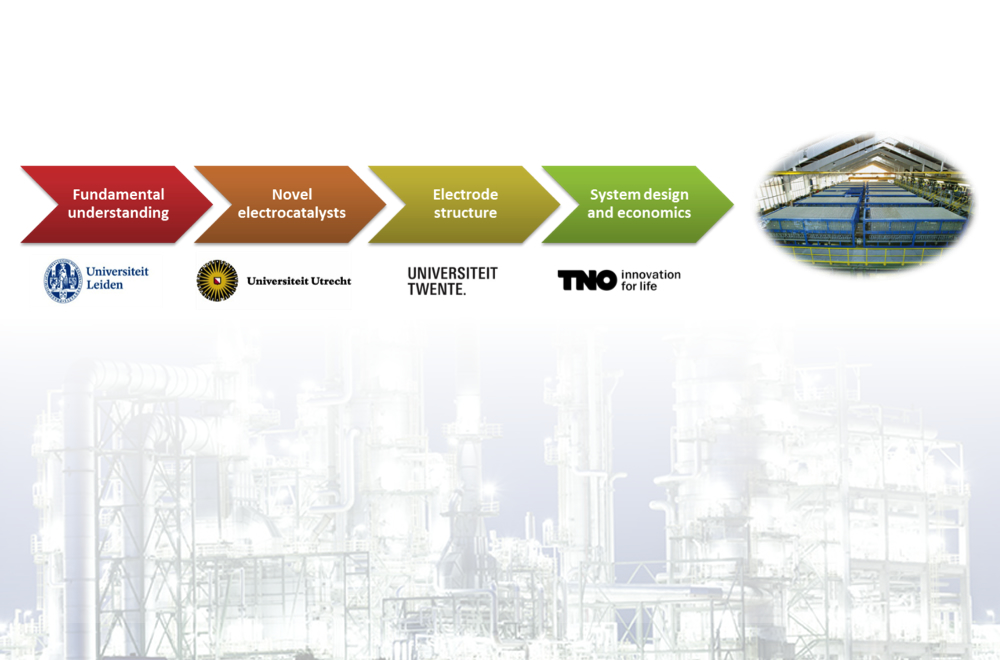

New project on electrochemical ethylene production from CO2
27-02-2018
 The efficient conversion of the greenhouse gas CO2 towards useful products using renewable energy is one of the key topics in the Power-2-Chemicals program line. If chemical products, like plastics and fuels, could be produced directly from CO2 using electrochemistry, this would greatly contribute to industrial decarbonization. However, scientific challenges still exist to reach a viable business case. This is one of the main reasons that VoltaChem recently started the project EleReCEt together with three top Dutch universities and industry, focusing on solving fundamental research questions in the direct electrochemical conversion of CO2 to ethylene, an important precursor for plastics.
The efficient conversion of the greenhouse gas CO2 towards useful products using renewable energy is one of the key topics in the Power-2-Chemicals program line. If chemical products, like plastics and fuels, could be produced directly from CO2 using electrochemistry, this would greatly contribute to industrial decarbonization. However, scientific challenges still exist to reach a viable business case. This is one of the main reasons that VoltaChem recently started the project EleReCEt together with three top Dutch universities and industry, focusing on solving fundamental research questions in the direct electrochemical conversion of CO2 to ethylene, an important precursor for plastics.
Academic-commercial collaboration drives new insights
The EleReCEt project “Electrochemical reduction of CO2 to ethylene” was developed in 2017 under the NWO Solar to Products program. This project is a collaboration between three top universities in the Netherlands in the fields of catalysis and electrochemistry - the University of Twente (Guido Mul), the University of Leiden (Marc Koper), and the University of Utrecht (Petra de Jongh) - plus VoltaChem/TNO and Shell as users of the research results. Through the highly complementary fields of expertise that the partners each bring to the project, technology for the electrochemical production of ethylene from CO2 will be advanced at several levels. TNO will take the academic results further, leading to a novel reactor design and evaluation of the future commercial potential with key factors for further research.
Project goals
The project will run for four years involving three PhDs (one at each university), experts in system design and techno-economic evaluation from VoltaChem/TNO, and regular input from Shell. The main goals of the project are to:
- Obtain a fundamental understanding of the CO2 and CO reduction mechanisms by DFT calculations over novel advanced electrode compositions;
- Synthesize novel electrode compositions, including alloy nanoparticles on the basis of Cu, as well as CuxS of various morphologies, and explore the influence of nanoparticle composition and morphology on CO2 and CO reduction/hydrogenation;
- Evaluate process conditions and novel porous hollow fiber electrode configurations in optimizing Faradaic efficiency and ethylene selectivity;
- Evaluate the process economics and use the results to guide the research activities and develop a commercially feasible system design.
Contribution to Power-2-Chemicals
At the kick-off, there was already much enthusiasm for the project and in-depth enlightening discussions among the partners, showing that this will be an important project with all the factors present to produce highly interesting results. Although the project will run for four years, it is expected that intermediate results can already be used in the framework of the VoltaChem program line Power-2-Chemicals. This will contribute to understanding and acceleration in parallel developments that are focusing on the electrochemical production of CO and Formic Acid.
Are you interested in this project or our developments in electrochemical CO2 reduction? Please contact Martijn de Graaff. We look forward to discussing your interests.
Share this page: